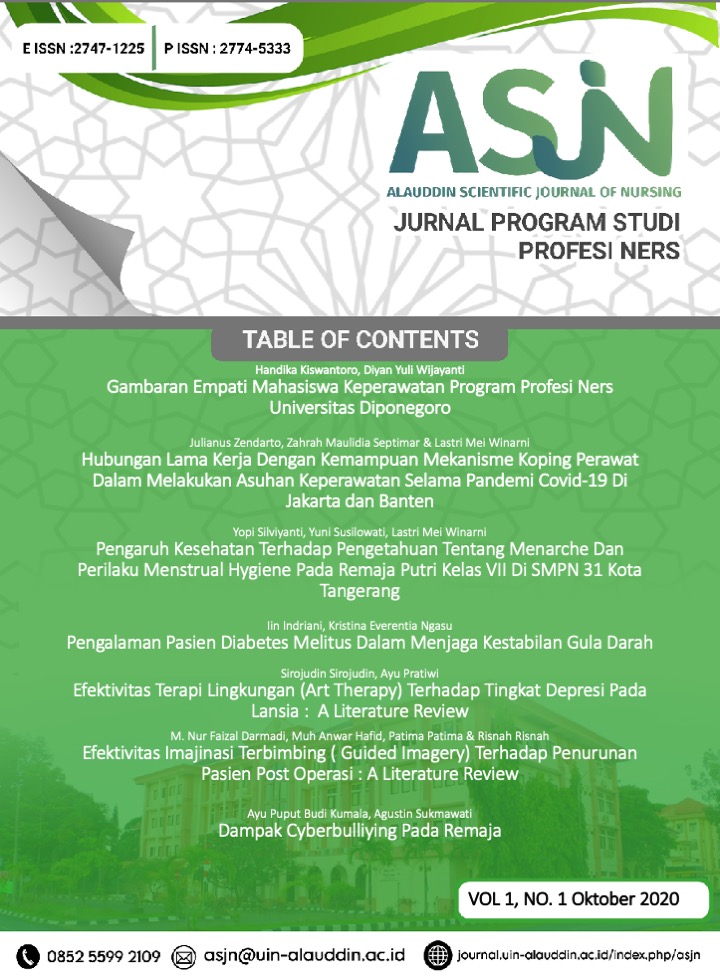GAMBARAN EMPATI MAHASISWA KEPERAWATAN PROGRAM PROFESI NERS UNIVERSITAS DIPONEGORO
Abstract
Empati penting bagi seorang perawat terutama untuk mahasiswa keperawatan karena empati mempunyai banyak manfaat seperti mengoptimalkan asuhan keperawatan kepada pasien, meningkatkan kemampuan interpersonal, membantu menyelesaikan masalah pasien, dan meningkatkan tingkah laku prososial. Empati mahasiswa keperawatan program sarjana menunjukkan 43,8% mahasiswa memiliki kemampuan empati kurang baik. Tujuan dari penelitian ini adalah untuk menggambarkan empati mahasiswa keperawatan program profesi ners Universitas Diponegoro. Desain penelitian yang digunakan adalah deskriptif survey, menggunakan kuesioner JSPE-R Version. Populasi dalam penelitian ini mahasiswa keperawatan program profesi ners Departemen Ilmu Keperawatan Universitas Diponegoro. Sampel penelitian berjumlah 119 mahasiswa program profesi ners dengan menggunakan teknik total sampling. Hasil penelitian diperoleh kemampuan empati mahasiswa keperawatan program profesi ners sebanyak 51,3% memiliki kemampuan empati baik dan 48,7% memiliki kemampuan empati kurang baik. Komponen empati dengan nilai rata-rata tertinggi yaitu perspective taking dibandingkan compassionate care dan standing of the patient’s shoes. Mahasiswa keperawatan dapat meningkatkan empati dengan cara emphatic care training, latihan dukungan sosial, dan mindfulness.
Keyword : empati, mahasiswa keperawatan, program profesi ners
Downloads
References
AIPNI. (2015). Kurikulum Inti Pendidikan Ners Indonesia. AIPNI : Jakarta.
Crawford, Paul, et al. (2014). The design of Compassionate Care. Journal of Clinical Nursing; 23 : 3589-3599.
Dulay, M. C. B., Domingo, J. E. A., Domingo, K. F. R., Domondon, H. O. F., Dumangon, L. G., Duran, R. A. D., & Sevilla, G. L. (2018). An Exploratory Study of Factors Influencing Student Nurses ’ Empathy. Journal of Nursing and Healtcare, 3(2) : 1-9.
Fauziah, N. (2014). Empati, Persahabatan, Dan Kecerdasan Adversitas Pada Mahasiswa Yang Sedang Skripsi. Jurnal Psikologi Undip; 13(1), 78–92.
Gholamzadeh, S., Khastavaneh, M., & Khademian, Z. (2018). The effects of empathy skills training on nursing students ’ empathy and attitudes toward elderly people. BMC Medical Education, 18(198) : 1–7.
Hartono, K.P. (2007). Analisis Data Kesehatan. Jakarta : FKM UI
Hidayah A, Kristanti MS, Sedyowinarso M. (2013). Perbedaan Kemampuan Empati Mahasiswa Keperawatan Di Program Studi Ilmu Keperawatan Fakultas Kedokteran UGM. J Pendidikan Kedokteran Indonesia, 2(3):1–7.
İster, E. D., & Altınbaş, Y. (2016). Emphatic Tendency and Affecting Factors in Nursing students. Asian Pac. J. Health Sci, 3(4) : 306–312.
Istiana. (2016). Hubungan Empati dengan Perilaku Prososial Pada Relawan KSR PMI Kota Medan. J Diversita., 2(2):1-13.
Kaur S., Saini S., Waia I. (2018). Assessment of Level of Empathy among Nursing Students during Internship. J. of Social Psychiatri; 34(1) : 57-61.
Lown, Beth A., et al. (2017). How important is compassionate healthcare to you? A comparison of the perceptions of people in the United States and Ireland. Journal of Research in Nursing; 22 (1-2): 60-69.
Ouzouni C., Nakakis K. (2012). An exploratory study of student nurses’ empathy. Health Science Journal, 6(3):534-552
Picket, P.L., Gardner, W.L., Knowles., M. (2004). Getting a Cue: The Need to Belong and Enhanced Sensitivity to Social Cues.Personality and Social Psychology Bulletin. 30: 1095–1107.
Segal, E. A., Wagaman, M. A., & Gerdes, K. E. (2012). Developing the Social Empathy Index : An Exploratory Factor Analysis, 13(3), 541–560.
Taufik. (2012). Empati Pendekatan Psikologi Sosial. Kesatu. Jakarta: PT. Grafindo Persada.
Triyanto, M. Nur. (2018). Gambaran Empati Mahasiswa Keperawatan Departemen Ilmu Keperawatan Fakultas Kedokteran Universitas Diponegoro. [Skripsi] PSIK FK Universitas Diponegoro Semarang.
Ward, J., Schaal, M., Bowen, M. E., & Erdmann, J. B. (2009). Reliability and Validity of the Jefferson Scale of Empathy in Undergraduate Nursing Students. J. of Nursing Measurement; 17(1) : 73-88.
Williams, Michael. (2012). Perspective Taking Building Positive Interpersonal
Connections and Trustworthiness One Interaction at a Time. Retrieved 18th March 2019, Cornell University, ILR School Site : htp://digitalcommons.ilr.cornell.edu/articles/1006


1.png)